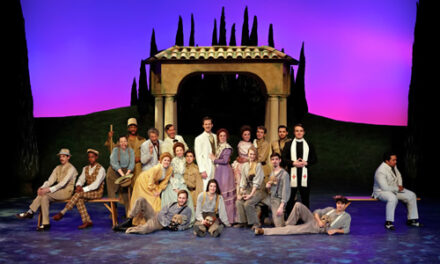For the 17th and 18th concerts of the Highlands-Cashiers Chamber Music Festival’s thirty-second season the Grammy winning Parker String Quartet presented a stunning program featuring works by Mozart, Schulhoff, and Beethoven.
The Parker String Quartet, consisting of violinists Daniel Chong and Ying Xue, violist Jessica Bodner, and cellist Kee-Hyun Kim, is a rapidly rising, award-winning ensemble that has dazzled audiences all across the world. Their program at the Albert Carlton Library (performed both Friday, August 2 and Saturday, August 3) opened with the straightforward Mozart String Quartet in E-flat, K. 428. As far as opening works go, this piece proved to be a well-practiced standard. However, it quickly became apparent that this type of work was not the quartet’s preferred repertoire, as there were subtle artistic differences between each player which were made obvious by the intimate venue’s peculiar acoustic properties, serving to make this piece an interesting window into each player’s style and attitude. In particular, the third movement of the work (the Menuetto, which is a dance-like movement in triple meter) brought out the group’s penchant for dances, as it was performed with a grace and lilt which is often called for, but rarely achieved.
The Menuetto proved to be a foreshadowing of the next piece on the program, the exciting String Quartet No. 1 from Czech composer Erwin Schulhoff. First violinist Daniel Chong gave a short explanation as to why this work was chosen to be performed alongside the much more prolific and respected Mozart and Beethoven. He explained that, much like Mozart, Schulhoff’s life was cut tragically short, and even during his lifetime his work was not well received. Nevertheless, the works Schulhoff left behind are extremely well-written and wonderful to play. The quartet perfectly demonstrated from the very first phrase the primal energy and passion Schulhoff was known for in his time. The work contained many dance-like motifs, and called for many advanced playing techniques to create a wide variety of sounds; some spooky and glass-like, others percussive and strong. The entire piece allowed the Parker Quartet to demonstrate why they are so decorated, operating simultaneously with emotion and machine-like precision.
The final work of the evening, Beethoven’s Quartet in E-flat, Op. 74 (otherwise known as the “Harp”), acted as a thematic blend of the first and second works of the program, combining the stark discipline of Mozart with the unbridled passion of Schulhoff. Coming from Beethoven’s “middle period,” the work has a distinctly Classical flavor. However, in typical Beethoven fashion he bucks tradition and begins with a slow introductory movement which transitions to the typical Allegro part-way through. The Parker Quartet pulled no punches and gave away no secrets, which made every unexpected moment of the work even more effective. The group was incredibly adaptive, changing moods and styles with great ease, which is often a difficulty when performing Beethoven’s works.
The Parker Quartet has a considerable reputation, one that is very much deserved. The professionalism and extremely high musicianship of each individual comes together in a very organic manner, allowing the group to function as one cohesive unit. They are capable of a great range of expressions, styles, and moods, and are an absolute pleasure to witness in performance.
The group will perform a new program consisting of Beethoven, Shostakovich, and Dvořák on Sunday, August 4 and Monday, August 5 for the Highlands-Cashiers Chamber Music Festival in both Highlands and Cashiers respectively.











